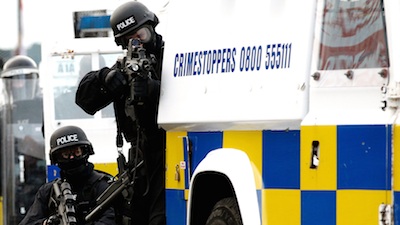
By Allison Morris (for the Irish News)
I’d never really thought to analyse the question ‘who won the war?’ because by my assessment the war is far from over. We’ve had historic events, yes. The big ‘hand of history on our shoulder’ moments. But the mechanics of the peace agreement and the society it was meant to have created - that process is still ongoing.
Peter Taylor is one of the finest journalists of his generation, the access he was granted to loyalist and republican, government official and gunman a testament to the universal respect that he commands.
His BBC documentary ‘Who Won the War?’ was a fascinating look at where we’ve come from, and where we are now in the long path from all out conflict to uneasy peace.
But even coming as it does 20 years on from the IRA and loyalist ceasefires deciding who won is still somewhat premature.
I’m a Troubles child born into and raised in west Belfast at the height of conflict. It didn’t particularly faze me at the time as I knew no different, I’d nothing to gauge my life against.
I was a mother myself when the ceasefires were called and there is nothing like the maternal instinct to cloud judgment. I yearned at that stage not for lofty political aspirations but simply a safe and peaceful environment.
The politicians who negotiated the truce knew this. They knew people were war weary and unlikely to ask too many questions or examine the fine print when sold what sounded at the time like a utopian society where the walls would come down, we’d embrace our neighbours, the grass would be greener and our rivers would run free.
The reality was somewhat different.
We have instead lurched from crisis to crisis, the assembly has collapsed and reconvened, victims are still without truth and justice.
The most interesting and telling aspect of the documentary was the change - or in some cases intransigence - in those who took part. Peter Taylor took archive footage of people he interviewed in some cases 40 years ago and replayed it to the men as they are now.
Some reacted the same way I do when I see pictures of myself in the 1980s dressed like a Madonna tribute act -- scundered -- others decided the best thing to do was brazen it out and claim they were right all along. Coincidentally almost all those featured were men. Apart from one intoxicated woman giving Orangeman Mervyn Gibson grief on the Twelfth my gender were a footnote to this examination of our conflict.
The most remarkable transformation was that of Martin McGuinness from radical young revolutionary to monarch-meeting deputy first minister.
The Derry republican truly has been on what reality show contestants call ‘a journey’.
And despite having agreed to a treaty that would have made Michael Collins blush he believes the current political strategy will lead to the promised land of a united Ireland. Jackie McDonald, one of the few UDA leaders who has survived since the years of war and peace, all others having either been murdered or deposed, appeared embarrassed by his younger self’s militant attitude.
McDonald is a man now grappling with trying to move his community forward, no easy task when those elected into power do little to ease the fears of the grassroots.
His loyalist counterpart, former UVF prisoner turned PUP leader Billy Hutchinson, seemed to have changed his language but not his views. He maintained when questioned by Peter Taylor that loyalist paramilitaries had prevented a united Ireland because, well, there isn’t one.
The smarmy former Labour leader Tony Blair said no-one won the war but “we all won the peace”.
It’s a slick enough soundbite but, as we enter into yet another round of all party talks, simply not accurate.
The latest talks announced by Theresa Villiers will include the Irish government who have been shamefully absent in the recent political crisis.
Enda Kenny has made it quite clear the north is low down on his list of priorities.
We’re told they will once again look at flags, parades and the past, matters that could not be resolved at the Haass talks, only this time just to liven things up they’ve thrown in welfare reform.
Good luck with that lads.
Peter Taylor concluded that unionists won the war as the union is now safe. Former hunger striker Gerard Hodgins agreed but added that they are too “stupid” to realise what they had gained from the Good Friday Agreement.
Both men’s views have validity but as talks begin again no-one can really claim victory in a race that is still being run.
While we have no clear winner what we do have is thousands of losers in the form of the victims of the war, those who never lived to see the settlement and the families they left behind.
People mentally and physically injured, people traumatised by their experiences and, while it may not be popular to say it, that includes those participants of the war who spent their youth in a prison cell.
One being Seamus McKinley, interviewed as a 12-year-old child, who said he wanted to grow up and fight and die for Ireland.
Forty years later he had fulfilled part of that ambition having served a jail term for the murder of a soldier.
At 52 he looked 20 years older, frail and in ill health, a childhood stolen by the circumstances he was born into. Seamus definitely didn’t win the war.
![[Irish Republican News]](https://republican-news.org/graphics/title_gifs/rn.gif)
![[Irish Republican News]](https://republican-news.org/graphics/title_gifs/harp.gif)

